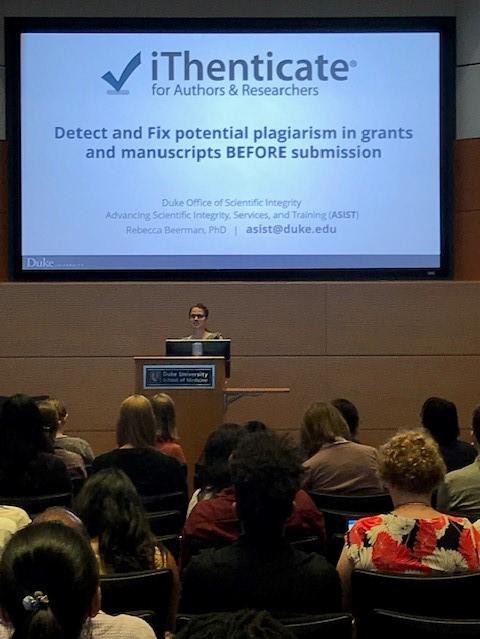
Investigators want to put their best foot forward in submitting high-quality, compliant applications to potential sponsors. Research teams often have a good sense of how they want to craft their aims and research strategy, but may spend a lot of time working on the “nuts and bolts” of their grant applications. To that end, the August 2019 town hall focused on making sure researchers know about the tools and resources available during the grant proposal development stage - everything but the science! Why worry about all of the sections outside of the research strategy? As Joanna Downer, Associate Dean for Research Development in the School of Medicine, said -- grant reviewers will notice if the level of quality is inconsistent, so “quality matters across the whole application.”
The following tools and resources were highlighted over the course of the event:
- New grant proposal toolkits are available now and consultation services continue to be supported and offered by the School of Medicine Office of Research Development and the Campus Office of Research Development.
- ScienCV is a great tool, supported by the Medical Center Library, to assist in building the biosketches required by federally funded agencies.
- Researchers are encouraged to use Duke’s anti-plagiarism software, iThenticate, prior to grant or manuscript submission. Free licenses have been activated for all Duke research faculty, and staff may also obtain licenses.
- myRESEARCHnavigators, accessible in the “Get Help” widget of myRESEARCHhome, can connect researchers to grant development resources and services if they are unsure where to start.
- New grant planning studios, a partnership between the Clinical & Translational Science Institute and the Duke Office of Clinical Research, can help bring the right people to the table as you are developing your proposal.
- The Office of Research Administration and Office of Research Support has several new tools and resources for grant proposal development and submission:
- E-attestations in myRESEARCHhome take the place of the paper DPAF.
- Written guidelines to help with submissions allow research teams to better understand what is required by central offices 5 days prior to the sponsor deadline.
- Forms, E templates, and tools are available for researchers applying for human subjects funding.
- Supplemental Application Support (SAS) services are now available to help research teams in the School of Medicine with project and timeline management. This offer is triggered at the time a researcher declares their intent to submit a proposal in myRESEARCHhome. To know more about this service, contact grantsupport@duke.edu.
Developing a high-quality grant proposal might be easier to manage with help from Duke’s network of support and resources focused on grant proposals… everything but the science!